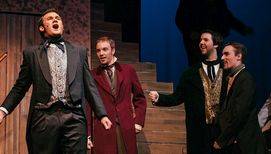One of my best friends from college summed up his feelings about the 1983 stage musical Les Miserables in the following manner: “If there’s a hell,” he croaked, “I’ll be trapped on that damn revolving stage forever while hookers flaunt their unwanted wares at me and some whack-job fundamentalist cop chases my ass for stealing a stale croissant.” In short, he was not a fan. The musical is indeed a divisive example of a polarizing time in the history of musical theatre that brought us such bloated and self-important operettas in the guise of serious musicals as Andrew Lloyd Webber’s Cats and Phantom of the Opera. Critics have found their tunes lacking, their opulence garish, and their storylines melodramatic and forced. Audiences around the world have ignored these quibbles and have gobbled these shows up, resulting in record ticket sales and near-endless runs and multiple touring companies.
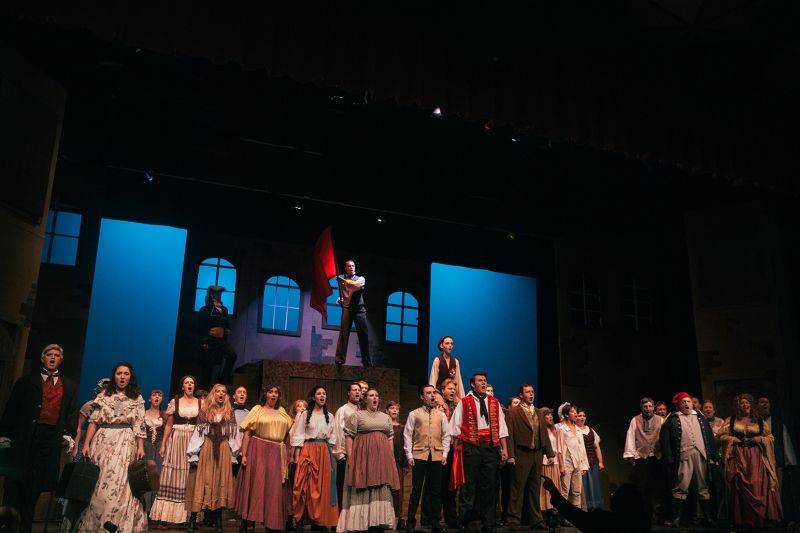
On the con side (in my opinion), these shows feature mostly sung storylines loosely based on a classic literary work, huge casts of characters that run past so fast they blur one into another, and scores that are overly orchestrated and largely forgettable. Phantom is the S&M drag queen dominatrix of the lot, all chandelier earrings and overly austere and ostentatiously decorated interiors. Cats is the dim-witted club queen of the trio with obscenely tight clothing and a lethal amount of hair care products and a spaceship or two thrown in for baffling measure.
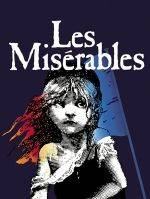 On the pro side, there’s Les Mis, the awkward stepsister with a heart of gold whonever quite cleans the lentils out of the fireplace and never really gets to go to the ball. It is the most tuneful and socially conscious of the three, and it’s also the most frequently produced on the regional and community theatre circuits. It is not as lavishly over-produced as its evil stepsiblings, has several memorable songs that have a life beyond their moment in the production, and actually makes us think about issues of class and humanity on a grander scale than the other two. Haters may hate on this period of musical history, but no one can deny this genre-maker-and-breaker’s influence when watching Rent or Next to Normal or even Spring Awakening. Screw the script, darling, and give us some meticulously proper singing from a cast of thousands. Stephen Sondheim be damned; we need more high notes stat, so cut to the chase, and cut the dialogue as well!
On the pro side, there’s Les Mis, the awkward stepsister with a heart of gold whonever quite cleans the lentils out of the fireplace and never really gets to go to the ball. It is the most tuneful and socially conscious of the three, and it’s also the most frequently produced on the regional and community theatre circuits. It is not as lavishly over-produced as its evil stepsiblings, has several memorable songs that have a life beyond their moment in the production, and actually makes us think about issues of class and humanity on a grander scale than the other two. Haters may hate on this period of musical history, but no one can deny this genre-maker-and-breaker’s influence when watching Rent or Next to Normal or even Spring Awakening. Screw the script, darling, and give us some meticulously proper singing from a cast of thousands. Stephen Sondheim be damned; we need more high notes stat, so cut to the chase, and cut the dialogue as well!
 The 1983 stage musical based upon Victor Hugo’s novel of the same name has music by Claude-Michel Schönberg, original French lyrics by Alain Boublil and Jean-Marc Natel, with an English-language libretto by Herbert Kretzmer. It had profitable runs in London and on Broadway (despite some critical sour grapes), and last year it begat a give me an Oscar-godamn-it film adaptation directed by Tom Hooperand starring Hugh Jackman, Russell Crowe, and the quivering and emaciated Ann Hathaway as a poor little baby-mama (Fantine) who is force to be a hooker by a moralistic society and is prematurely sent to Heaven for her troubles. Hollyweird saw the real tears and snot running down that pert little nose and awarded her and the production with numerous statuettes of gold. Ultimately, Hugo’s storyline about a man who steals some bread (Jean Valjean), goes to jail, and does hard time, only to escape, experience a religious conversion, and redeem himself, all the while being constantly in fear of a really pesky cop (Javert) who refuses to give the bread thief a break. (And yes, it’s impossible to describe this musical without a run-on sentence.) Purists of the stage version think the film sacrifices singing quality for star power, but the film’s proponents, myself included, think it clears out the clutter of all those perfectly sung notes and affords the audience a truly moving meditations on the cost of idealism and the difficulty of redemption. There are rabid fans of this work on every side of the debate, and they defend their point of view with every mounted production. Due to the nearly three hour run time and largely forgettable score, I sort of land on the “meh” side of the debate. Typically, I enjoy watching this musical cycle through a venue near me about every seven years or so. Like locusts. Or a bad outbreak of influenza.
The 1983 stage musical based upon Victor Hugo’s novel of the same name has music by Claude-Michel Schönberg, original French lyrics by Alain Boublil and Jean-Marc Natel, with an English-language libretto by Herbert Kretzmer. It had profitable runs in London and on Broadway (despite some critical sour grapes), and last year it begat a give me an Oscar-godamn-it film adaptation directed by Tom Hooperand starring Hugh Jackman, Russell Crowe, and the quivering and emaciated Ann Hathaway as a poor little baby-mama (Fantine) who is force to be a hooker by a moralistic society and is prematurely sent to Heaven for her troubles. Hollyweird saw the real tears and snot running down that pert little nose and awarded her and the production with numerous statuettes of gold. Ultimately, Hugo’s storyline about a man who steals some bread (Jean Valjean), goes to jail, and does hard time, only to escape, experience a religious conversion, and redeem himself, all the while being constantly in fear of a really pesky cop (Javert) who refuses to give the bread thief a break. (And yes, it’s impossible to describe this musical without a run-on sentence.) Purists of the stage version think the film sacrifices singing quality for star power, but the film’s proponents, myself included, think it clears out the clutter of all those perfectly sung notes and affords the audience a truly moving meditations on the cost of idealism and the difficulty of redemption. There are rabid fans of this work on every side of the debate, and they defend their point of view with every mounted production. Due to the nearly three hour run time and largely forgettable score, I sort of land on the “meh” side of the debate. Typically, I enjoy watching this musical cycle through a venue near me about every seven years or so. Like locusts. Or a bad outbreak of influenza.
In contrast, the Champaign Urbana’s Theatre Company seems to have a higher tolerance for this work, since they have produced it numerous times over the past ten years, and their audiences have positively responded by returning for each and every iteration. What makes the 2013 offering different from its predecessors is the fact that this is the first production with adult actors involved. All of the previous CUTC productions of Les Mis have been student shows with no one over age 18 eligible to audition. And what makes Les Mis Jr. more kid-friendly? Mostly a few dropped swear words and some awkward pre-teen streetwalkers. Were I a parent, I’d prefer my child say a swear word or two rather than mime a lewd act as a gutter trollop who is singing a peppy tune. But, no one has ever accused me of being family-friendly, so what do I know? This time for CUTC, the grownups take over the awkward bits, and the result is a bit less disquieting for my delicate sensibilities.
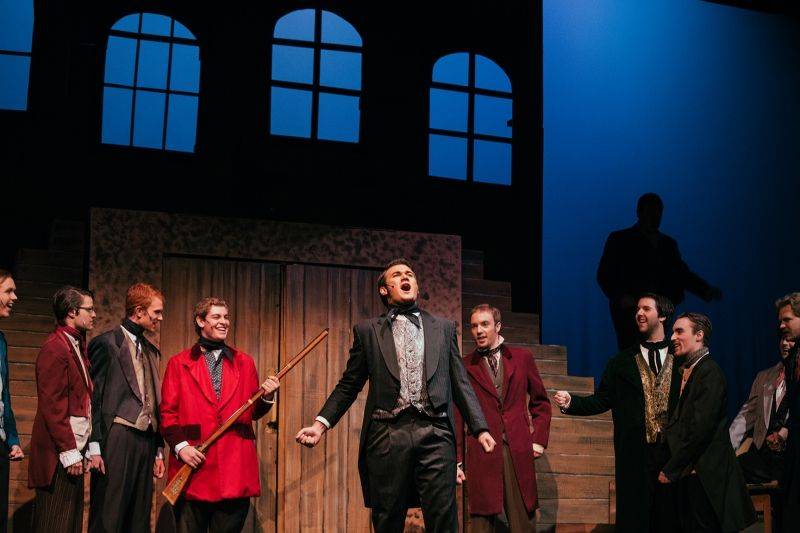
With skillful direction by Stephen Fiol and the consistently quality musical direction of Aaron Kaplan, this production works hard to overcome the challenges of the piece and provides an enjoyable (if lengthy) evening of entertaining theatre. The production boasts gorgeous costuming by Christy Steele, LaDonna Wilson, Caryl Henkle, and Susann Le; an attractive and functional set by Bernie Wolff; lovely lighting design moments by Bob Weber; impressive hair and wig design by Adrian Rochelle; and clever and witty choreography by CUTC vet Whitney Havice. Full disclosure: I watched a final dress rehearsal, so some technical glitches, missed cues, and awkward maneuvering of costume pieces are to be expected and can be expected to be corrected before opening night. The use of the Parkland Theatre side space for title projections and one stunning moment of emotional depth during the song “Empty Chairs at Empty Tables” is a fine choice, giving the audience context and location and also in the noted musical moment, providing the intimate emotional power that only a film can do. The Parkland stage itself proves a challenge because, with the large and impressive orchestra assembled by Kaplan, the only choice is to open the pit, thus negating the production’s signature use of a revolving stage.
This slows down the set changes slightly, and with the orchestra lights glaring throughout there are some odd moments of stagehands scurrying away from deathbeds and such. The use of the pit also makes the staging space a long and narrow challenge for a large cast and set pieces to navigate, which is particularly awkward in the numerous stage combat moments. All that said, the staging is well thought-out, and everything moves along relatively smoothly. In fact, I thought the CUTC staging improved upon a moment that has always troubled me in previous, revolving-stage versions. That moment is Javert’s climactic suicide, which has always looked relatively silly in professional stagings and is very arresting in this production.
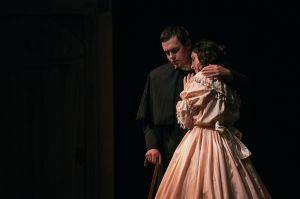
The cast is stellar, with some wonderful musical talent and some surprisingly effective acting moments. I say the latter because the structure of the show lends itself to melodramatic poses and skimping on acting in favor or killer vibratos. Every emotion is intense and a bit hammy as written, which is a lot to cope with for threehours with one intermission, but the director and his actors do a good job of cutting the fat and allowing some real humanity to come through. Timothy Renner’s Javert is appropriately single-minded and creepy and has a powerful voice throughout. As Jean Valjean, Kyle Pollio sings beautifully and is quite effective in the show-stopping “Bring Him Home,” a lovely song in the second act. Bethany Stiles is also in good voice as the doomed Fantine and is truly touching in the character’s downward spiral. Corbin Knight-Dixon’s Marius sings more than acts at the start of his performance, but eventually shows major acting chops in “Empty Chairs at Empty Tables.” Caitlin Caruso-Dobbs makes a lovely and poised adult Cosette, Fantine’s orphaned child and Jean Valjean’s delicate ward, and her younger counterpart, Ana Almeida, is adorable.
 I have to confess to a huge girl crush on local powerhouseactress Marah Sotelo, and her performance as the adult Eponine only strengthens my obsession with a powerful rendering of the lovely “On My Own.” As her character’s younger self, Paulina Bucaro is equally adorable. As Gavroche, Ruth Zielke is plucky and perky throughout and gives a good performance. (Note: many of the younger roles are double cast for this production. For example: Paulina Bucaro is young Eponine and Ruth Zielke is Gavroche when Ana Almeida plays young Cosette.) As the idealistic student revolution leader, Enjolras, Edward Brennan has a strong voice and an earnest demeanor, and his idealistic student cohorts (Ian Lee, Logan Colla, Kyle Ayers, Macauley Allen, Kevin Hodge, and Trey Ball) are effective in the rousing “Do You Hear the People Sing?”
I have to confess to a huge girl crush on local powerhouseactress Marah Sotelo, and her performance as the adult Eponine only strengthens my obsession with a powerful rendering of the lovely “On My Own.” As her character’s younger self, Paulina Bucaro is equally adorable. As Gavroche, Ruth Zielke is plucky and perky throughout and gives a good performance. (Note: many of the younger roles are double cast for this production. For example: Paulina Bucaro is young Eponine and Ruth Zielke is Gavroche when Ana Almeida plays young Cosette.) As the idealistic student revolution leader, Enjolras, Edward Brennan has a strong voice and an earnest demeanor, and his idealistic student cohorts (Ian Lee, Logan Colla, Kyle Ayers, Macauley Allen, Kevin Hodge, and Trey Ball) are effective in the rousing “Do You Hear the People Sing?”

Some welcome relief from the grim and earnest proceedings are the comic moments sprinkled throughout, and the evil money-grubbing Thenardiers are skillfullyrendered by James C. Dobbs and LaDonna Wilson. They are an absolute slimy hoot of a couple and nearly stop the show on several occasions. And finally, special note needs given to the ladies of the night: Arianne Cohen, Katie Craft, Mary Ellison, Kinzie Ferguson, Jenny Gleason, HeatherAnn Layman, Kate Myer, Monica Samii, Anna Summers, Chloe Ward, Laura Welle, Jesse Debolt, and Ranae Wilson for their fun and frilly rendition of “Lovely Ladies,” which is the first sign of light in the grim first moments of the piece. Please note that most of the leads have understudies, and the juvenile roles are double cast, so you may see a different actor than listed in this review depending on which night you attend.
This production does a lot right with a show that can be a monster to mount and a yawn to watch in less competent hands. It is worth seeing because some of the greatest talent in the C=U musical theatre scene has assembled for this piece. While the length may be daunting to some, the seats in the Parkland College Theatre are comfy and the production is smart and earnest, so come support CUTC and see this well done show.








